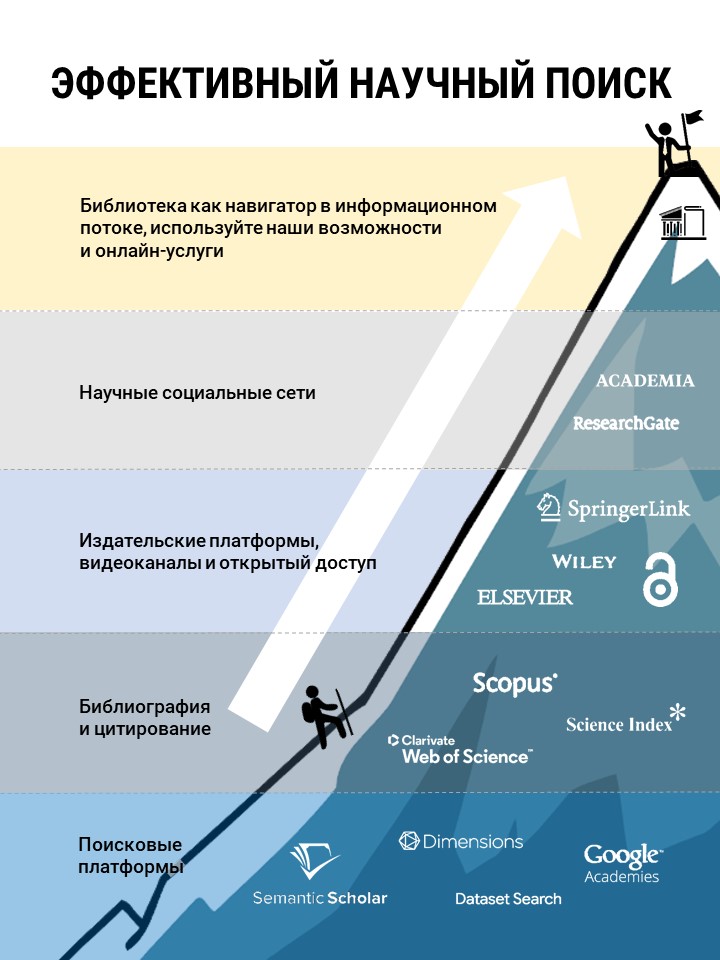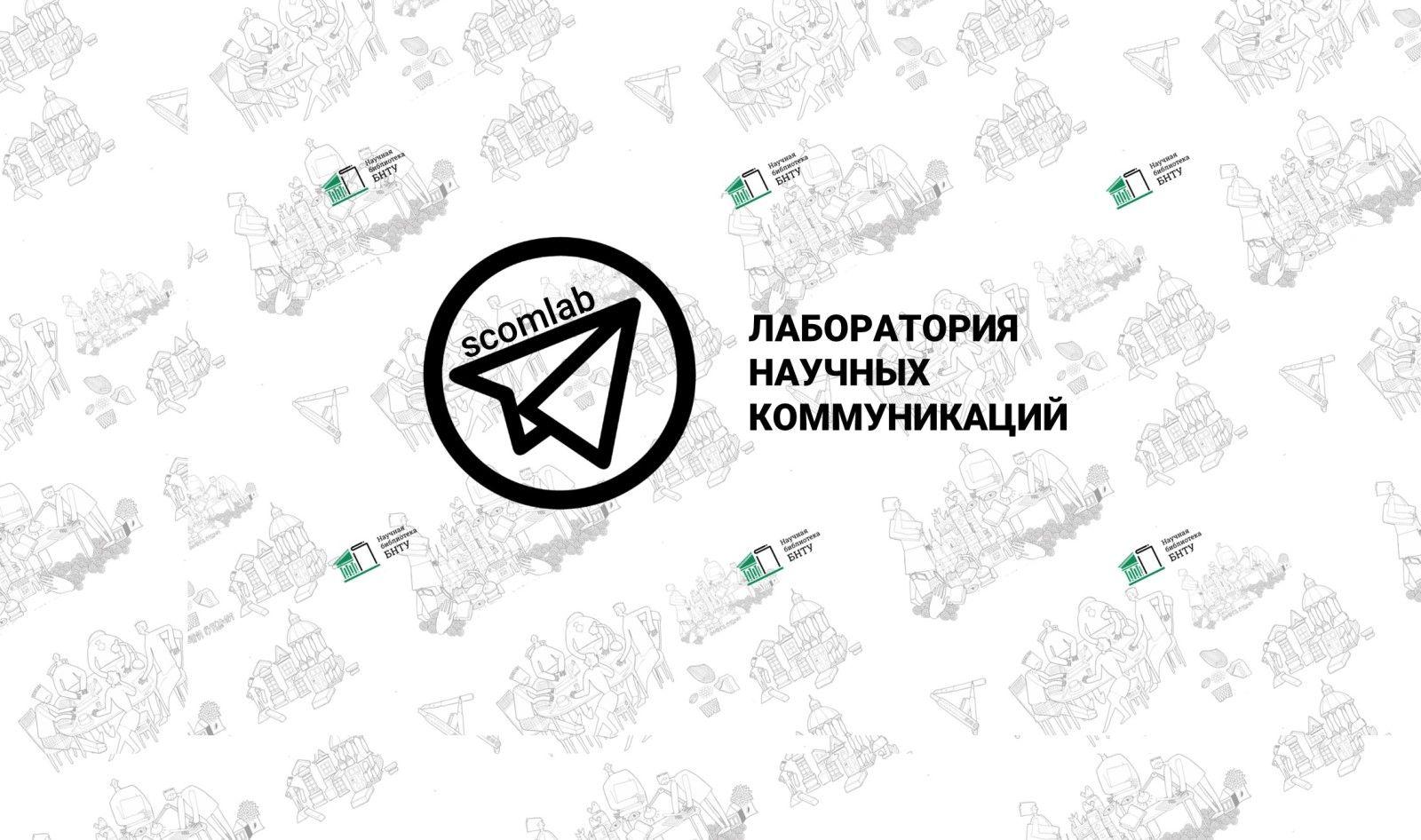Effective scientific information retrieval: tips for researchers
The BNTU Scientific Library offers users a new guide to the retrieving for scientific information, which will introduce the currently available opportunities, tools and resources for search and will allow you to choose the most effective strategy for obtaining the necessary information.
The scientific information retrieval has always been a significant and time-consuming stage of the work of a researcher. Currently, due to the growing amount of publications and data, the development of technologies and the system of scientific communications, this task has become much more complicated. Navigating a considerable array of scientific information, as well as mastering various search tools that are constantly bring upgraded, might be difficult not only for a novice researcher, but also for an experienced one. In the “Scientific information retrieval” guide we offer recommendations on how to find exactly what you need and not lose valuable time.

“Laboratory of Scientific Communications” - a new Telegram channel for researchers
The BNTU Scientific Library invites the research community of the university as well as all interested parties to join the Telegram channel devoted to modern scientific communications.
Do you want to learn how to effectively promote your scientific ideas and outcomes? Are you interested in the news from the largest publishers? Are you looking for authoritative scientific information? Are you looking for authoritative scientific information? All this and much more can be found on the “Laboratory of Scientific Communications” Telegram channel that have been created by the BNTU Scientific Library for informational support of researchers!
Scientific communication is currently a very dynamic and advanced system that provides many opportunities and tools for the successful development of scientific activity. We invite you to subscribe to our channel and receive the most relevant, useful and interesting information!

BNTU and open access to scientific information
The theme of the International Open Access Week–2020 is “Openness with a target: taking steps to create structural equity and integration”. This format provides an opportunity for the scientific community to learn more about the benefits of open access and inspires further development of the concept of open access to make it the norm in the field of academic research. The Belarusian National Technical University and the BNTU Scientific Library actively develop open access to scientific information and support a number of special resources for this purpose.
The Belarusian academic community faces the problem of accessibility and openness of information. Joining the open access movement can help Belarusian scientists and researchers to get acquainted with the achievements of world science; also it can serve as an incentive to improve the quality of their own publications and to promote the results of scientific activities. The Belarusian National Technical University (BNTU) and the BNTU Scientific Library support the concept of open science development in our country and contribute to the development of open access. All the journals published by the University are open access journals, which contributes to a more effective exchange of scientific ideas and research results. The library supports not only the BNTU journal platform, but also the University Repository, which provides open access to educational and scientific papers of the University for a wide audience of users. In the issues of the electronic digest entitled “InfoGenerator” we offer you to get acquainted not only with educational and scientific resources provided for the University community by subscription, but also with authoritative public resources on the Internet. The Open science section of the website of the BNTU Scientific Library focuses on various aspects of open science in general.
Openness and accessibility of information are powerful tools both for improving the system of scientific communication and for providing equal opportunities for all members of the world scientific community. This is exactly what the organizers–the SPARC (Scholarly Publishing and Academic Resources Coalition) and the experts of the Advisory Committee Coalition–say. In their opinion, diversity, equality and inclusiveness should be further factors in the development of the scientific sphere.
Open access has a great potential for further development of science and contributes to disseminate information about research among all interested groups of scientists, thus creating equal opportunities for them and promoting cooperation and uniting the world scientific community to solve urgent and significant problems.
Open science: publications, data, peer review, methodology, software, education
The Open science section of the website of the BNTU Scientific Library is a navigator for high-quality open sources with annotations and explanations. The collection of resources consists of open publications and research data, open peer review and evaluation, open methodology, open software, and open education.
Open science is a movement aimed at improving the productivity of the research process by promoting closer collaboration, transparency, and efficiency through:
• supporting a culture of openness and data dissemination,
• developing new technologies,
• developing and implementing evaluation and motivation systems.

Publication activity: recommendations to authors
The Publication activity section has been opened on the website of the BNTU Scientific Library to help researchers. The Data presented in this section significantly help to effectively organize the preparation of high-quality scientific papers.
The main attention is paid to the following aspects:
• indexing in scientometric databases and services of WOS, Scopus, RSCI and Google Scholar,
• creating an authoritative reputation of authors in modern electronic means of scientific communication,
• improving the performance of research activities of BNTU.
Evaluation of scientific activity:
• comparative analysis of citation indexes;
• indicators for evaluating scientists and organizations.
Recommendations for preparing articles for peer-reviewed scientific journals:
• for conducting scientific information retrieval;
• for selection of the journal for submitting an article on a given topic;
• concerning technical requirements for original papers and for design of reference lists according to the standards adopted by foreign scientific publishers.
Promotion of scientists and organizations:
• placement of scientific papers in author identification systems;
• activities in scientific social services in order to develop international cooperation between scientists, create prerequisites for citation of their papers and accumulate feedback on the publishing papers;
• the role of the researcher's publication activity in the University's ranking positions.
Library services aimed at supporting publication activity:
- Consultations and scientometric research:
• Analysis and clarification of the author's ID in scientific citation databases,
• Determining the values of bibliometric indicators of a scientist, viz. of the number of publications, the citations rates, the value of h-index,
• Researcher's map: analytical reference based on scientific citation databases.
It is free of charge for BNTU employees, while for third-party users this service is paid.
- Trainings in working with citation databases. Training topics:
• registration in author identification systems (Author profile in Google Scholar; Scopus Author ID; Researcher ID; ORCID; SCIENCE INDEX);
• working with citation databases (determining the number of published documents based on Scopus, Web of Science and SCIENCE INDEX data; determining the number of citations to published documents based on Scopus, Web of Science and SCIENCE INDEX data; determining the scientist's h-index value based on Scopus, Web of Science and SCIENCE INDEX data);
• definition of indicators of scientific journals (impact factor; SNIP (Source Normalized Impact Per Paper); SJR (Scimago Journal Rank);
• selection of journals for submitting scientific papers.
Registration for the training for authors
Contacts: Department of scientific communications development (65 Nezavisimosti Ave., room № 377). Natal'ya S. Dydik, tel. 293-91-51.
Page 9 of 9
